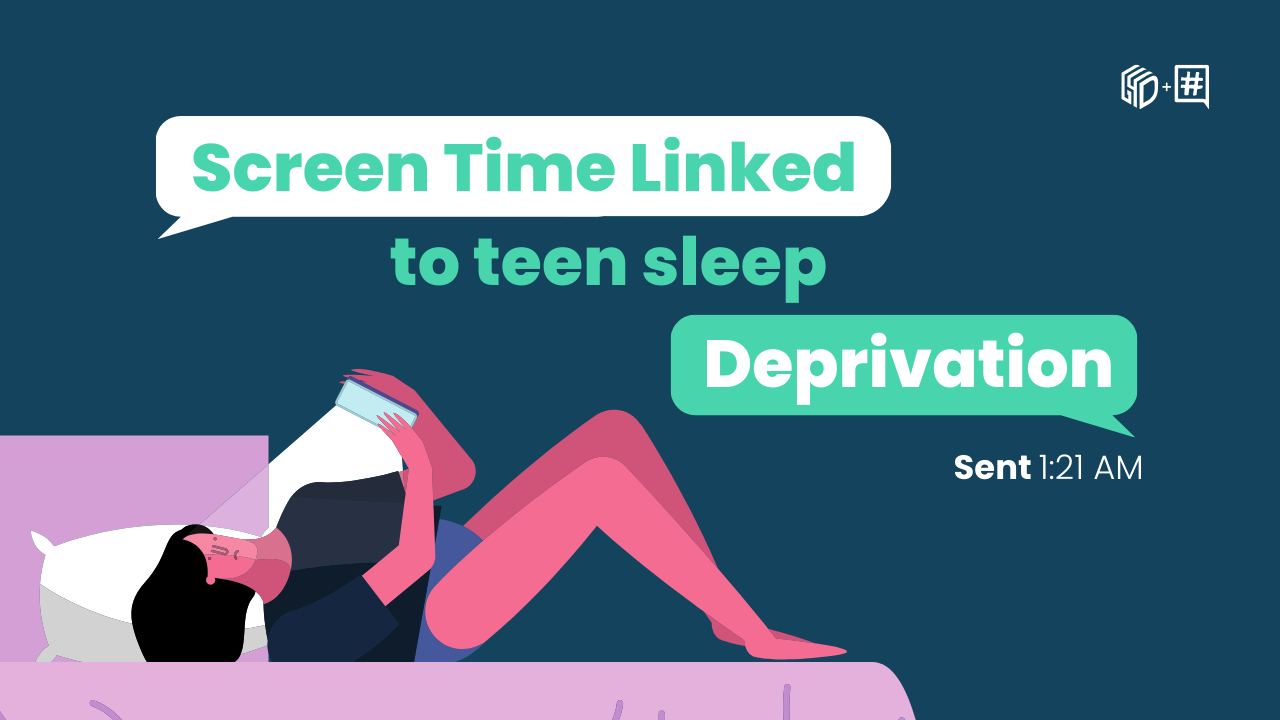Screen Time Linked to Teen Sleep Deprivation
Nov 01, 2023
By: Terrence Mccullough, Seasonal Public Relations Intern | Digital4Good
Today we're diving headfirst into an issue that's been affecting our young ones in more ways than we might think. We all know that teenagers are busier than ever before – school, extracurriculars, and maybe even part-time jobs. But there's something lurking in the shadows, something that might be keeping our teens up at night. You guessed it – screen time. So, let's talk about how it's linked to sleep deprivation in teenagers.
The Sleepless Struggle
Life for teenagers today is a whirlwind of activity. They're juggling school, hobbies, and jobs, and it's no surprise that their schedules can be incredibly hectic. The result? Sleep deprivation. When you're burning the candle at both ends, it takes a toll on your mental health and academic performance.
According to the Centers for Disease Control and Prevention, a whopping 72% of high schoolers aren't getting enough sleep on school nights. That's a staggering number, and it's a cause for concern. Teens between the ages of 13 and 18 are reporting that they're not hitting the recommended hours of shut-eye.
The Dark Side of Sleep Deprivation
Now, let's talk about what sleep deprivation does to our teens. It's not just about feeling a bit groggy in the morning. It can wreak havoc on their concentration, memory, and even their physical reflexes. Plus, it leads to more sick days from school. But here's the real kicker: drowsy driving. A CDC study found that teen and young adult drivers are more likely to be affected by it.
Drowsy Driving Danger
Drowsy driving is no joke, folks. It's when you hit the road while you're sleepy or fatigued. This can happen because you didn't catch enough Zs, but it can also be due to untreated sleep disorders or working those late-night shifts. And the consequences can be deadly.
You'll make impaired decisions, your reaction time will slow down, and you'll struggle to stay focused. The CDC has a scary statistic: teens are at a higher risk of being involved in drowsy driving accidents, and guess what? Sleep deprivation plays a massive role in that risk.
The Culprit: Screen Time
Now, we get to the real heart of the matter – screen time. It's the modern-day culprit of sleep deprivation among teens, and it's causing a loss of precious sleep time. The CDC and other sleep-focused organizations have zeroed in on this problem.
The National Sleep Foundation found that 57% of teens have trouble sleeping when they keep a small screen, like a smartphone or TV, in their bedroom. Those late-night notifications can be a real sleep disruptor, let me tell you.
Blaming the Screens
So, why are screens such sleep thieves? Well, it's all about the blue light they emit. This pesky blue light messes with melatonin production and disrupts your sleep pattern. According to a report from the Sleep Foundation, these electronic back-lit devices, including cell phones, tablets, and computers, are the culprits. They emit short-wavelength enriched light – that's the dreaded blue light. And guess what? It reduces or delays the production of melatonin, making it harder for you to feel sleepy.
And it doesn't stop there. Blue light can also mess with the important sleep cycles, like slow-wave and rapid-eye movement sleep. These stages are crucial for a teenager's restful slumber – slow wave helps the body relax, and rapid eye movement plays a role in dreaming, memory, emotional processing, and healthy brain development.
Getting Teens Back to Sleep
Alright, you've heard the facts, and you're probably wondering what you can do to help your teenager get a good night's sleep. Well, don't fret – I've got some tips to help you combat sleep deprivation and that screen addiction.
Set Screen Time Boundaries
First things first, set some boundaries for screen time. Make sure your teens are putting those devices away at least an hour before bedtime.
Establish a Bedtime Routine
A regular bedtime routine can work wonders. Create a soothing pre-sleep ritual to signal to their brain that it's time to wind down.
Create a Sleep-Friendly Environment
Make sure their sleep space is comfortable and conducive to rest. A calm and relaxing bedroom is key.
Designate a Screen-Free Zone
Create a screen-free zone in their bedroom. This will help their brain associate the bedroom with sleep, not Snapchat.
Watch Out for Evening Stimulants
Keep an eye on their caffeine intake. Avoiding coffee, tea, and energy drinks in the evening can make a big difference.
Get Those Extra 30 Minutes
Encourage them to add an extra 30 minutes of sleep to their night. It can add up over time.
Remove Electronic Devices
Last but not least, consider removing electronic devices like TVs, computers, and smartphones from the bedroom altogether.
If you're hungry for more tips on how to ensure your teens get the sleep they need, check out the CDC's tips for better sleep.
And for those of you looking for resources on mental health or digital safety products, head over to www.icanhelp.net. It's time to make sure our teens are getting the rest they deserve and that screen time isn't robbing them of a good night's sleep.
Stay connected with news and updates!
Join our mailing list to receive the latest news and updates from our team.
Don't worry, your information will not be shared.
We hate SPAM. We will never sell your information, for any reason.


